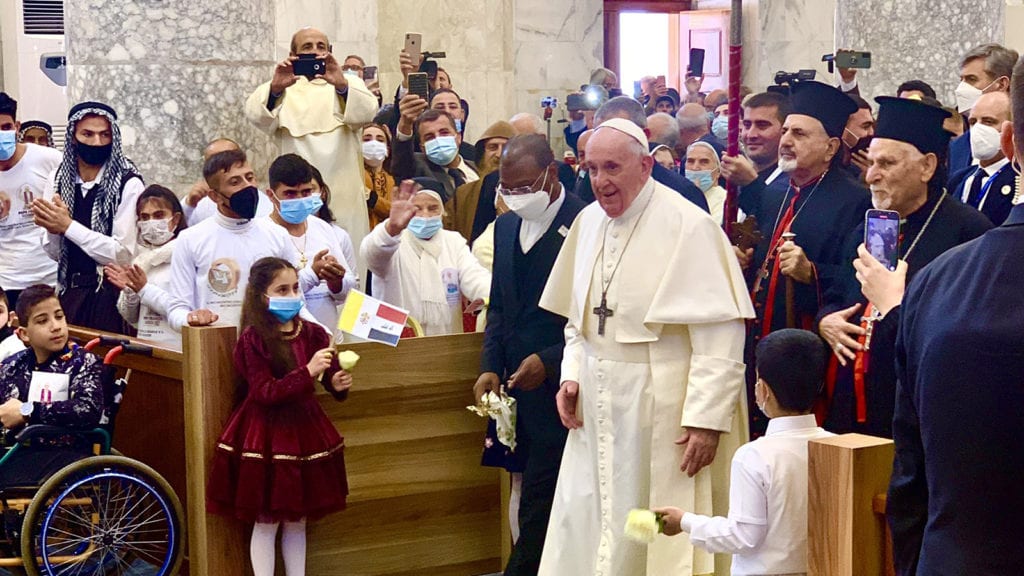Pope Francis completed his historic trip to Iraq over March 5-8, making him the first Bishop of Rome to visit the country for as long as records have been kept. Despite concerns about COVID and terrorist attacks the trip went smoothly: Iraqis jubilantly greeted their first-ever papal visitor everywhere he went.
The ramifications of the visit were discussed in a webinar hosted by The Berkley Center for Religion, Peace and World Affairs at Georgetown University. The participants included Shaun Casey, director of the Berkeley Center, Ricardo Cristiano, an Italian journalist and Vatican expert, as well as Fr. Antonio Spadaro, editor of La Civiltà Cattolica. It was Francis’ first international trip in 15 months, finally giving him the opportunity to exit the quarantine of the Vatican.
In Francis’ first speech he spoke of the unique challenges facing the Iraqi people, some of which came from within and others from without. Internally, the Iraqis must create a “healthy pluralism,” said Spadaro of the Pope’s message.
“There must be the participation of all religious, political and social groups. No one should be considered as a second class citizen,” Spadaro continued. However, beyond the internal struggles between Sunni, Shia, Christian and Yazidi Iraqis the international community also has a role to play in rebuilding stability.
As Spadaro noted, Iraq finds itself in the crossfire of many international rivalries. To the south, Saudi Arabia wishes to establish itself as the global center of Islam by exporting puritanical Wahabbist Sunni Islam to Muslim schools across the world. To the east, Iran imagines itself as residing over a resurrected Persian Empire that will stretch across the Middle East, with ultimate spiritual authority residing with Ayatollah Khamenei of Iran.
With Saudi Arabia exporting extremist Sunni Islam and Iran exporting extremist Shia Islam it shouldn’t be surprising that their mixing in Iran leads to volatility. But Spadaro went on to add that while the Iranians push for Shia dominance over Iraq the Turks are happy to compete with the Saudis for Sunni dominion over Iraq. Just as Iran dreams of a new Persian Empire, so too do the Turks imagine a new Ottoman Empire. Lastly, Spadaro said that even Moscow has aspirations of “reaching over the Strait of Hormuz” to be a real power player in the Middle East.
With so many outside influences promoting sectarian strife at the expense of national unity, it shouldn’t be surprising that Iraq has had much trouble. Indeed, even just the sight of the Pope visiting, standing alongside Iraqi authorities, was very impressive and spoke to the strides Iraq has recently made, said Spadaro.
Cristiano also said he believed that Francis’ trip could mark a turning point for intra-Islamic strife. He described mainstream Islam as being susceptible to “Islamic nihilism” where apocalyptic groups can recruit anyone angry enough to become violent.
In contrast, Francis showed himself to be a friend to popular non-extremist Islam that could reunite the country. He notably met with Ayatollah Sistani, the highest Shia authority in Iraq, in a move designed to defuse sectarianism within the country.
Panelists agreed that so much competing foreign influence is destabilizing. Shia and Sunni Islam aren’t inherently problematic for nation-building. But, when the highest Shia authority is the Ayatollah of Iran and the highest Sunni authority rests in Saudi Arabia with each promoting their own national interests, it’s hard to keep Iraq together.
Francis’ visit to Mosul was laden with significance. The Pope visited four different churches throughout the city, held by Islamic State from 2014-2017, praying at each of them for the victims of war. He also visited Ur, birthplace of Abraham, where he spoke at an interreligious ceremony of Jews, Muslims and representatives of other religions [Editor’s note: the website Aleteia reports Jewish participation here].
“Here, where Abraham our father lived, we seem to have returned home… God asked Abraham to raise his eyes to heaven and to count its stars [Gen 15:5]. In those stars, he saw the promise of his descendants; he saw us,” Francis said in a speech. “Today we, Jews, Christians and Muslims, together with our brothers and sisters of other religions, honor our father Abraham by doing as he did: we look up to heaven and we journey on earth.”
With this message of unity, the Pope reminded Iraqi citizens that, across their respective faiths, they share binding ties. As Spadaro said, Francis showed Abraham can be a model of interreligious politics which embraces fraternity without understating differences. It’s an invitation to leave the ties and attachments that close us into our groups and prevent us from seeing others as our brothers and sisters which is where the path to peace begins.






Comment by Palamas on March 16, 2021 at 3:10 pm
I hope the pope’s visit to Iraq will bring a measure of security and religious freedom to Iraqi Christians. They have suffered to much at the hands of Sunni and Shia, Arab and Kurd. The West must act if one of the oldest Christian communities in the world is to be saved from extinction.
There is one correction needed to this article: the pope’s visit to Ur didn’t involve an “interreligious ceremony of Jews, Muslims and representatives of other religions.” There were no Jews present, because no matter what the pope wanted, the Iraqi government would not permit Jews to participate.
Comment by David on March 17, 2021 at 7:06 am
The Shia/Sunni conflict is similar to the Protestant/Catholic conflict in Europe in the 1600s. I would not expect any resolution in the near future. Both sides claim to have Allah on their side.
Comment by Search4Truth on March 21, 2021 at 9:22 am
David, is there any subject for which you are not the world’s ultimate authority?